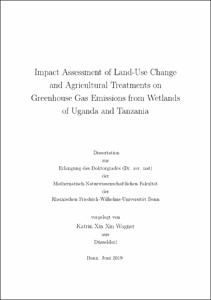Wagner, Katrin Xin Xin: Impact Assessment of Land-Use Change and Agricultural Treatments on Greenhouse Gas Emissions from Wetlands of Uganda and Tanzania. - Bonn, 2020. - Dissertation, Rheinische Friedrich-Wilhelms-Universität Bonn.
Online-Ausgabe in bonndoc: https://nbn-resolving.org/urn:nbn:de:hbz:5-57284
Online-Ausgabe in bonndoc: https://nbn-resolving.org/urn:nbn:de:hbz:5-57284
@phdthesis{handle:20.500.11811/8272,
urn: https://nbn-resolving.org/urn:nbn:de:hbz:5-57284,
author = {{Katrin Xin Xin Wagner}},
title = {Impact Assessment of Land-Use Change and Agricultural Treatments on Greenhouse Gas Emissions from Wetlands of Uganda and Tanzania},
school = {Rheinische Friedrich-Wilhelms-Universität Bonn},
year = 2020,
month = feb,
volume = 483,
note = {Wetlands play an important role in global climate regulation as they represent a great global carbon sink. Moreover, wetlands provide optimal conditions for food production and support the livelihoods of many people in Sub-Saharan Africa with food supply. The conversion of natural wetland areas to farmland seriously affects valuable ecosystem services, including global climate regulation, and can result in altered greenhouse gas (GHG) emissions. Therefore, a main challenge of sustainable wetland management is to find a reconciliation between food production and mitigation of GHG emissions. For the development of management recommendations, GHG emission data from wetlands in Sub-Saharan Africa are highly needed, because the numbers of GHG studies conducted in this region are low. This study aimed to reduce this knowledge gap and assessed GHG emissions from wetlands in East Africa with consideration of contrasting wetland types, different types of land use and different hydrological positions within the wetland. Moreover, different agricultural treatments were evaluated with respect to their effects on yield-based GHG emissions. Two field experiments were established in different wetland types in East Africa. The first test site was located in an inland valley wetland in Uganda, while the second one was located in a floodplain of the Kilombero river in Tanzania. CH4, CO2 and N2O emission data were collected with static chambers for a total sampling period of two consecutive cropping and fallow periods. During data analysis, a lack of systematic quality assurance of GHG data from static chamber measurements became apparent. Thus, an eight-step data quality management system based on objective criteria was developed to ensure data reliability and improve data acceptance rates. The quality-checked results of this study confirmed that land-use change had a significant impact on GHG emissions, as the global warming potential (GWP) considerably increased after the conversion of natural wetlands to farmland. Moreover, this study showed that intensification of food production did not result in significantly higher yield-based GHG emissions. Intensive cropping treatments with fertilizer application showed equally high or even lower global warming potential indexes (GWPI) compared to non-fertilized treatments. In conclusion, intensive cropping management practices with high yield potentials represent a possible trade-off between food production and GHG emissions. However, to achieve GHG emission mitigation, a combination with natural wetland areas spared from agricultural production is essential.},
url = {https://hdl.handle.net/20.500.11811/8272}
}
urn: https://nbn-resolving.org/urn:nbn:de:hbz:5-57284,
author = {{Katrin Xin Xin Wagner}},
title = {Impact Assessment of Land-Use Change and Agricultural Treatments on Greenhouse Gas Emissions from Wetlands of Uganda and Tanzania},
school = {Rheinische Friedrich-Wilhelms-Universität Bonn},
year = 2020,
month = feb,
volume = 483,
note = {Wetlands play an important role in global climate regulation as they represent a great global carbon sink. Moreover, wetlands provide optimal conditions for food production and support the livelihoods of many people in Sub-Saharan Africa with food supply. The conversion of natural wetland areas to farmland seriously affects valuable ecosystem services, including global climate regulation, and can result in altered greenhouse gas (GHG) emissions. Therefore, a main challenge of sustainable wetland management is to find a reconciliation between food production and mitigation of GHG emissions. For the development of management recommendations, GHG emission data from wetlands in Sub-Saharan Africa are highly needed, because the numbers of GHG studies conducted in this region are low. This study aimed to reduce this knowledge gap and assessed GHG emissions from wetlands in East Africa with consideration of contrasting wetland types, different types of land use and different hydrological positions within the wetland. Moreover, different agricultural treatments were evaluated with respect to their effects on yield-based GHG emissions. Two field experiments were established in different wetland types in East Africa. The first test site was located in an inland valley wetland in Uganda, while the second one was located in a floodplain of the Kilombero river in Tanzania. CH4, CO2 and N2O emission data were collected with static chambers for a total sampling period of two consecutive cropping and fallow periods. During data analysis, a lack of systematic quality assurance of GHG data from static chamber measurements became apparent. Thus, an eight-step data quality management system based on objective criteria was developed to ensure data reliability and improve data acceptance rates. The quality-checked results of this study confirmed that land-use change had a significant impact on GHG emissions, as the global warming potential (GWP) considerably increased after the conversion of natural wetlands to farmland. Moreover, this study showed that intensification of food production did not result in significantly higher yield-based GHG emissions. Intensive cropping treatments with fertilizer application showed equally high or even lower global warming potential indexes (GWPI) compared to non-fertilized treatments. In conclusion, intensive cropping management practices with high yield potentials represent a possible trade-off between food production and GHG emissions. However, to achieve GHG emission mitigation, a combination with natural wetland areas spared from agricultural production is essential.},
url = {https://hdl.handle.net/20.500.11811/8272}
}






